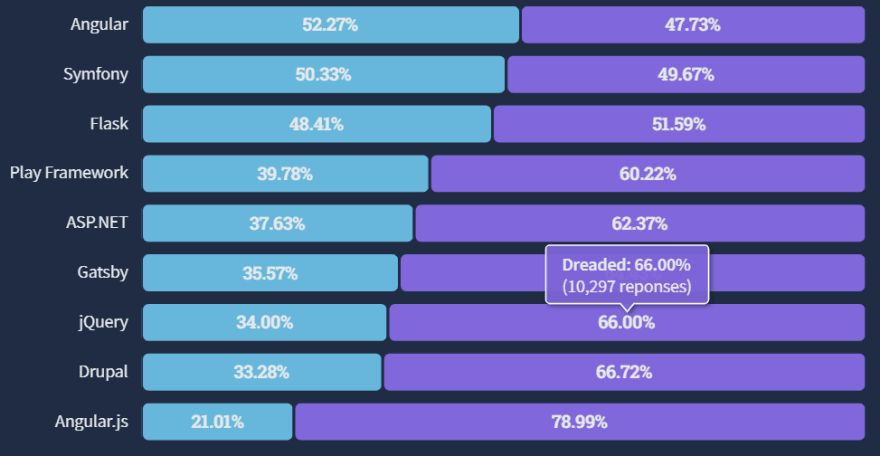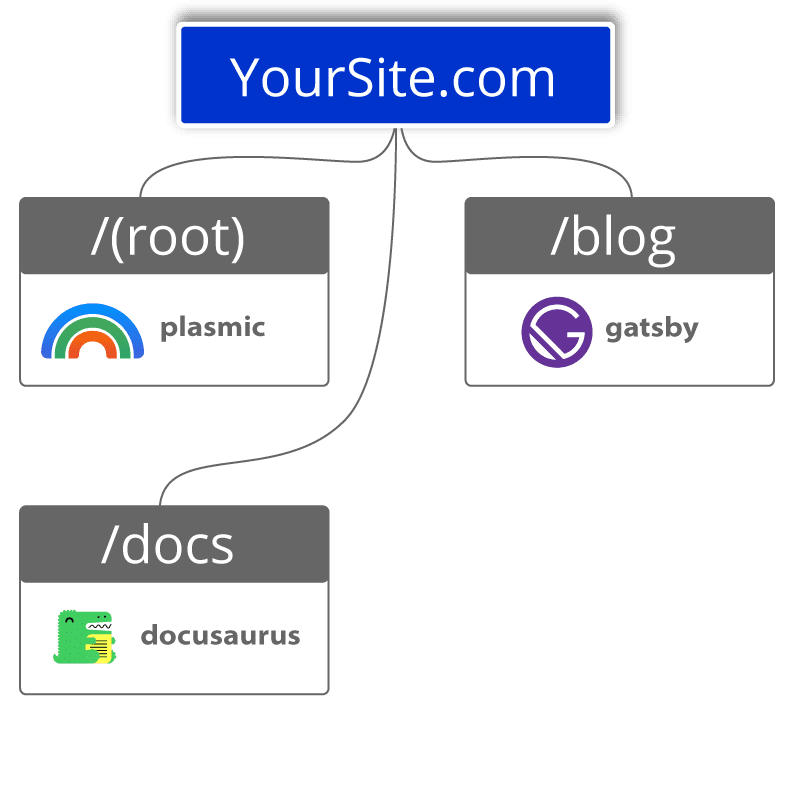It’s that time of year again, when StackOverflow’s developer survey is released. And that means it’s time to update which JavaScript frameworks are most popular in 2022. Read which were most popular in 2021, here.
No matter your experience level, you likely have a favorite JavaScript framework you use.
Most developers do have favorites, and for a variety of reasons.
Popularity, experience, usability, support, features and flexibility; these are all some of the reasons developers give as to why they pick one over another. And, when you find one that works, why go out and learn the ever-growing list of options?
While there may be different variables to consider for each individual developer, popularity is certainly incredibly important.
Popularity
But why is popularity crucial?
We’re not making this a popularity contest, and because we employ modular/micro frontends, we’re framework agnostic.
However, popularity is important for many reasons.
First, if you and your team are working on a long-term, big-time project, you want to make sure the framework you’re using is going to be around throughout the entirety of the process. Imagine starting an important website build and the framework suddenly falls off the face of the planet, that’d be a nightmare.
Next, that popularity guarantees more developers know how to use that particular framework. If your first developer leaves, you should be able to fill their spot with another team member. Or, in the case of our micro frontends, you may want multiple team members on the same team who know that same framework. They can collaborate and help one another build something special.
And if your company expands, you will be able to find new developers who use that popular framework.
With that in mind, let’s look at which frameworks are the most popular in 2022.
Most loved
Interestingly from this year’s StackOverflow survey, Svelte has been knocked from the top spot and replaced by Phoenix. A staggering 83.51% of respondents love the framework, making it the only one to hit into the 80th-percentile. Phoenix has been around for a while, but the latest version dropped in January of this year and developers are eating it up. Phoenix boasts an improved productivity for developers along with improved performance and the framework being highly scalable as well.
Next up is Svelte, holding strong at 75.28%, followed by another newcomer in Deno (72.32%), ASP.NET Core (71.49%) and another newcomer to the list Next.js (69.23%). In all, there are eight new frameworks on this list of the top-16 compared to last year. Besides the first three we mentioned, keep an eye on Node.js, Next.js, Blazor, Fastly and Laralevel as they continue to get vetted and evaluated by developers.
Also of note, we don’t see React.js -- which many still hold onto as the most widely used framework of the bunch – until 6th on the list. Angular has dropped to 17th.
Most dreaded
On the opposite end of this list, the “dreaded” few.
Keep in mind Angular and Symfony are just on the plus side of the evaluation.
Others which developers dread using include Flask (51.59%), Play Framework (60.22%), Gatsby 64.43%), jQuery (66%) and Drupal (66.72%).
Most wanted frameworks
What about the most desired frameworks?
StackOverflow also asked which frameworks developers wanted to use, but they weren’t currently using.
There’s where we see React.js jump back up the list, pointing to the likelihood that it’s still one of the most popular frameworks out there. It’s possible, even, that developers moved to a new framework over the last year and wanted to go back to React.
Then, in second is Node.js (16.12%), third is Vue.js (14.6%), fourth is Next.js (11.28%) and so on. It seems many on the list are the newcomers to the “most loved” list, pointing to developers possibly hearing about how great they are and then saying, “Hey, I want to try that!”
Conclusion
When we started off the year, we were writing a lot about Angular, React, Vue and Svelte. Those four frameworks have remained popular, with Svelte surging to the top in 2021 and staying strong in 2022.
And really, React is still considered the most – or one of the most – popular frameworks (libraries) in the world, too. Especially for larger-scale projects, and there’s a strong chance developers know React when you hire them. That’s not necessarily the case with, say, Phoenix as it’s so new to the game. Although, that may change by next year if it stays this popular; a whole host of developers will learn it.
Angular seems to be fading away slowly, although, there are some still hanging onto the older, robust framework.
Meanwhile, there new kids on the block are numerous and exciting choices at that.
Next.js works on top of React, it produces performant websites thanks to static site generation and features easy customization and use of SEO. Node.js is easy to learn, very good for scalability – see: future-proofing your stack – and gives high-performance for real-time applications.
To finish off the “Ns” Nuxt.js is built on Vue, but instead of creating single page applications (SPAs), Nuxt renders on both the client and server side. That means preloading the page on the server side, and sending out prerendered HTML. That improves SEO because Google can read the page instead of a blank page, as with other SPAs.
Want to learn a popular JavaScript framework? React seems like the best bet. However, there are many great options available, with frameworks growing seemingly by the day.
Use multiple frameworks on your site at Fathym
Have a favorite JavaScript framework you want to build exclusively with? You can develop your site at Fathym and we’ll host, leveraging our Microsoft Azure cloud.
Or, maybe you want to try out a new framework? Multiple new frameworks? Multiple frameworks AND a no-code site builder side-by-side? You can do all of that on ONE website thanks to Fathym’s JAMstack modular workflow.
Mind blown, right?







Top comments (3)
I'm really glad that React.Js and Next.Js remain closer to the top
Are those the ones you use, Sashe? What do you like about using them?
Yes, those are the ones I use. JSX is my favourite part of React, and the several options for server side rendering are what I like in Next.Js 😍